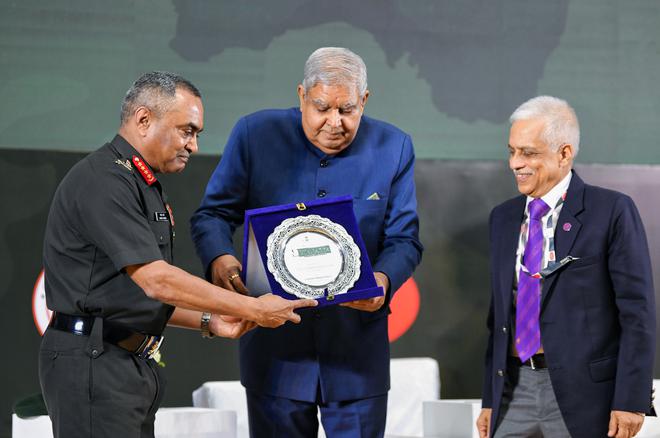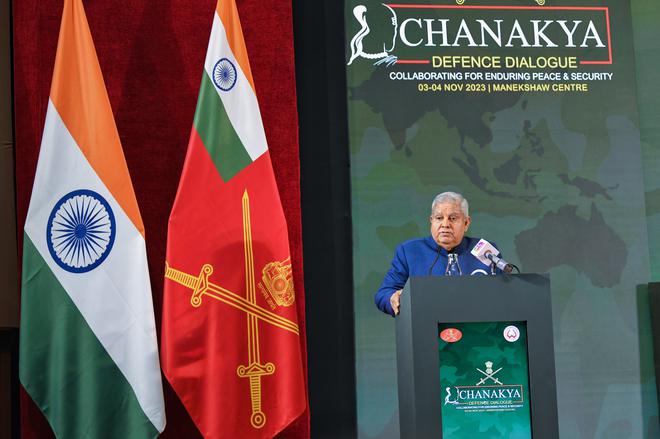Strength does matter and strength of a nation is the most impactful defence and deterrent, Vice-President Jagdeep Dhankhar said while stating that one needs to be possessed with strength to be relevant and to secure proper global order. Army Chief General Manoj Pande noted that not only is the Cold War peace dividend “dwindling”, the world seems to be fracturing in myriad ways while terming India a ‘bright spot’.
They were addressing on Friday the inaugural two-day ‘Chanakya Defence Dialogue’ jointly organised by the Army and the Centre for Land Warfare Studies.
“Peace is not an option. It is the only way. Its disruption leads to human misery and global challenges. There is need to seek peace at all costs — through ideation, advocacy, outreach, persuasion and dialogue — as also through strength, the later one being of extreme importance,” Mr. Dhankhar said. “In such a scenario the wisdom of such a world view is reinforced by the worrying turn of global events in recent times — more specifically, the expanding arc of conflict and the failure of deterrence, first in Ukraine and now in West Asia. It is worrisome that globalisation and economic interdependencies are failing to preclude conflict.”
Talking of India’s global engagements, Gen. Pande said, “In the military domain, we understand our role in the multilateral engagement architecture. We are keen to enhance the scope and scale of our joint exercises, interoperability, sub-regional perspectives and sharing of best practices, with our friendly foreign partner nations. To give a fillip to our defence cooperation outreach, we are establishing defence wings at new locations across the world. Our national resolve to achieve self-reliance in defence hardware is also being enabled by a resurgent Indian defence industry.”

New divisions
On the global situation, the Army Chief said new divisions are coming to the fore between the East and the West as also between the Global North and the Global South. The globalised world that we once applauded is now fraught with difficulties, he said, noting that it is moving towards decoupling, de-risking and perhaps de-globalisation.
In this regard, Gen. Pande said technology is driving geo politics like never before, transforming, not only strategic competition but also war fighting. In fact, technology is emerging as a new strategic arena of geo-political competition, he said, even as grey zone contestations in non-traditional domains seem “to be expanding, so is the probability and arch of all-out conflict.”
“Amid such despondency it is my belief that India remains a ‘bright spot’. The nation’s resolve, resilience and diverse capacities were put through a severe test during the pandemic,” Gen. Pande said, adding that “not only did we ride the storm rather well, the outreach through ‘Vaccine Maitri’ won universal acclaim.” “An agile, resilient, consumer-driven economy has enabled us to brave the economic downturn of the Russia-Ukraine conflict.”
Talking of the dialogue, Gen. Pande said the Chanakya Defence Dialogue structured around six sessions intends to stir deliberations to address contemporary security issues. The envisioned outcome is to foster collaborative efforts to address global issues and pilot the course of comprehensive security within our neighbourhood and the Indo-Pacific with the prospective of ensuring the safety of the global commons
Reverse flow
Addressing the conclave, former Foreign Secretary Vijay K. Gokhale noted that in the ensuing five centuries between 1500 CE and 2000 CE power flowed along the Atlantic axis, from one western hegemon to the next, but in the 21st century, however, we are witnessing a reverse flow, he stated. Indo-Pacific is leading global growth with emerging markets growing faster than developed markets, he said. “In 2023, what is undeniable is that the global theatre of greatest action is no longer the Mediterranean-Atlantic but the Indo-Pacific.”
On the Indo-Pacific, Mr. Gokhale said two narratives have gained currency. One is China’s rise and accompanying thirst for energy, markets, commodities and influence which unified the Indian and Pacific oceans in a new post-Cold War construct, he said, terming China the ‘true progenitor’ of the Indo-Pacific. The second narrative is that the U.S. is the real progenitor of the Indo-Pacific, first pro-actively aiding China’s rise which also lifted all other boats in the Indo-Pacific and now, again pro-actively, leading the pack to balance a risen China. This did not matter so long as both collaborated on common goals and managed their differences in ways that helped the Indo-Pacific region, he noted, but of late, the competitive spirit is giving way to a sharper rivalry.

“But it is equally true that neither is the U.S. any longer capable of solely or even predominantly guaranteeing peace and stability in the Indo-Pacific; nor is China’s economy a sole engine of global growth,” Mr. Gokhale said. In the changing power dynamics of the region, their diverging interests are likely to plunge the Indo-Pacific into tension and uncertainty that could potentially harm the rest, Mr. Gokhale said, adding that “we are being compelled to choose”.
The dialogue is inspired by the sagacity of the ancient strategist Chanakya, the Army said in a statement. It aims to unfold crucial discussions on global and regional security issues with a distinctive emphasis on south Asian and Indo-Pacific security dynamics, road map for collaborative security in the region, optimisation of emerging technologies for defence and security, ways to enhance collaborative capacity of Indian defence industry and options for India to achieve comprehensive deterrence, it stated.
Shared vision
Lisa Curtis, senior fellow and Director of the Indo-Pacific Security Programme at the Washington D.C. -based think tank Center for a New American Security, described the growing cooperation and partnerships in the Indo-Pacific as a “networked security architecture.” Emphasising on the Quad as a premier grouping of the region, Ms. Curtis said, “Though not a security platform, the Quad is about four powerful democracies coming together with a shared vision, pooling their resources and capabilities to realise their shared vision.”
In particular, she stressed on the critical minerals and the supply chain vulnerabilities, which are critical for transitioning to renewable sources of energy. China controls 2/3rd of the global critical mineral supply as well as 80% of their processing. Ms. Curtis said Beijing is already exercising its leverage over critical minerals like in the recent case of restrictions on Gallium and Germanium exports which was not the first time. “The Quad must take this issue head on,” she said, referring to the Quad’s efforts for cooperation on critical minerals and supply chain resilience and called for “greater urgency” in addressing the issue. “India plays a critical role in helping to maintain a stable and secure Indo-Pacific.”
China is seeking to marginalize U.S. influence in the region and increasingly deny the U.S. access tointernational sea lanes and airways,” Ms. Curtis, former US Government official, said adding China also seeks to establish technological dominance in the region and to control the information space.
On this she said, Competing with China requires Washington to not only invest in its own technological and defense capabilities but also to “work closely with allies and partners to shape the environment in which China operates.”
!["[T]he First and Fifth Amendments Require ICE to Provide Information About the Whereabouts of a Detained Person"](https://images.inkl.com/s3/publisher/cover/212/reason-cover.png?w=600)






